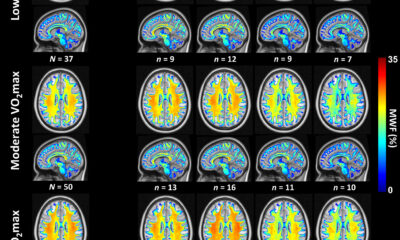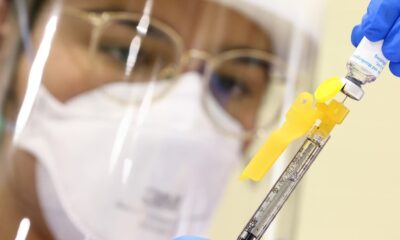Sports
Jannik Sinner says goodbye to fitness coach and physiotherapist in the Clostebol doping case

Three days after the International Tennis Integrity Agency (ITIA) announced that world number 1 Jannik Sinner had tested positive for a performance-enhancing drug, the Italian confirmed he had parted ways with the two men at the center of the doping case that turned everything upside down. the tennis world this week. During a press conference Friday, he said he was relieved that the news was known after months of investigation.
In his first public comments, Sinner said he had found comfort in knowing he had never intentionally done anything wrong, but had to break away from the trainer and physiotherapist responsible for allowing the banned substance into his system.
“Because of these mistakes, I don’t feel very confident about continuing with it,” Sinner said of Umberto Ferrara, his fitness coach, and Giacomo Naldi, his physiotherapist, during a press conference ahead of the US Open. “I have had a lot of trouble in recent months. Now I was waiting for the result, and now I just need some clean air.”
Ferrara and Naldi were part of the tight-knit squad that helped Sinner, the 22-year-old Italian, reach the pinnacle of the sport.
“We have decided to part ways and will no longer work together,” said Sinner’s spokesperson on behalf of the team. “We wish them the best of luck.”
Naldi had not accompanied Sinner to events since Halle, a grass court tournament in Germany in June that serves as preparation for Wimbledon. Ferrara had not been to Sinner since Wimbledon, which ended in mid-July.
Throughout those months, Sinner has balanced the stress of trying to clear his name through the arduous anti-doping process with being the world’s best tennis player and trying to win real tournaments.

Sinner first tested positive at Indian Wells, where he lost to Carlos Alcaraz in the semi-finals (George Walker/Icon Sportswire via Getty Images)
“It was a long process,” Sinner said. “I was always afraid it would one day come true. At first it was a different point of view, but then it became a little more complicated. I went through it, me and my team and the lawyers, I’m just a simple tennis player.”
Since testing positive for clostebol, a banned anabolic steroid, in March, Sinner has learned that being a top tennis player can be anything but easy.
He received a provisional suspension for each failed test, the first on March 10 at the BNP Paribas Open in Indian Wells, California, and the second on March 18 during an out-of-competition test.
An independent tribunal convened by the International Tennis Integrity Agency (ITIA) accepted Sinner’s explanation that his two adverse analytical findings (AAF) for clostebol were caused by the actions of Naldi and Ferrara. It found “no fault or negligence” on Sinner’s behalf, but stripped the Italian of his ranking points, prize money and results from California. Two independent review boards, also convened by the ITIA, came to the same conclusion after Sinner appealed the two provisional suspensions mandatory in the event of an AAF.

GO DEEPER
What players’ reaction to Sinner’s doping case says about their confidence in their sport
The review boards granted these appeals, meaning Sinner could continue playing during the investigation. It also meant that those provisional suspensions remained not public.
According to the tribunal’s full ruling, released Tuesday by the ITIA after a hearing on August 15, Ferrara purchased a product called Trofodermin in Italy in February. This is a spray used to heal cuts and is available without a prescription in Italy. Clostebol is one of the ingredients.
Naldi then cut himself with a scalpel he used to treat calluses on Sinner’s feet during the tournament, before using that spray to help heal the cut. He then gave Sinner a massage on his back and applied treatments to his feet. Sinner suffers from a skin condition that causes itching, and when he scratches himself, he causes small cuts.
Clostebol is an old steroid that was once at the center of the infamous East German doping scandals of the 1970s and 1980s. It can help build muscle mass and speed recovery after intense workouts. Its presence in the healing creams available in Italy and other countries has been known for years among those who keep abreast of anti-doping information, especially among Italian sports figures who have tested positive for similar reasons.
Sinner said Ferrara has long approached his work with great care, especially when it comes to nutrition and medicine.
When the ITIA informed him of the positive test, he immediately went to Ferrara and was convinced that his spray was the cause.
He said they went straight back to the ITIA with the explanation, which led to him being allowed to continue playing.
“We had to figure out what would happen in the future,” he said. “They believed in me and in us, and that’s why I could have played.”
That was a relief, he said, especially knowing he had done nothing wrong.
“I knew I was very clean, and I knew I always really looked forward to being an honest player,” he said, although he knows the positive tests will inevitably cause a blow to his reputation; a hit that will carry him through this tournament and perhaps beyond.
“It may change a few things, but anyone who knows me very well knows that I have done nothing and I would never do anything that is against the rules,” he said. “It has obviously been a very difficult moment for me and my team. It still is, because it’s pretty fresh.”
(Andy Cheung/Getty Images)













